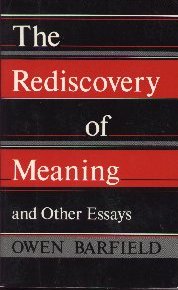
| Spirit |
Ironically, our understanding of the nature
of spirit has been drastically curtailed because of the influence of the
church, as Burgeon explains in Unancestral Voice:
[The Church] eliminated the whole concept of Spirit--though she still used the word. Removed it from the category of things needing to be understood, from the category of things that are knowable, or even thinkable. But she went farther than that. She denied the very presence of the Spirit in the human soul. By doing so, she left the West with that forlorn duality of soul and body, of ghost and machine, which has ever since determined the shape of its science, its history and its so-called doctrine of evolution. . . . the anathematizing of the Spirit itself . . . was the disaster, for it was this that severed humanity from its own past, and in doing so, murdered history. (101)
| See in particular "Matter, Imagination, and Spirit" (RM 143-54). |
| 1"We are never more aware of ourselves as immaterial," Barfield observes, "than when we are in the very act of perceiving" (RM 148). |